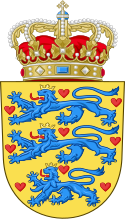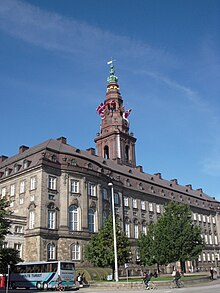Politics of Denmark
Politics of Denmark Danmarks politik | |
|---|---|
 | |
| Polity type | Unitary parliamentary constitutional monarchy |
| Constitution | Constitution of Denmark |
| Legislative branch | |
| Name | Parliament |
| Type | Unicameral |
| Meeting place | Christiansborg Palace |
| Presiding officer | Henrik Dam Kristensen, Speaker of the Parliament |
| Executive branch | |
| Head of State | |
| Title | Monarch |
| Currently | Margrethe II |
| Appointer | Hereditary |
| Head of Government | |
| Title | Prime Minister |
| Currently | Mette Frederiksen |
| Appointer | Monarch |
| Cabinet | |
| Name | Cabinet of Denmark |
| Current cabinet | Frederiksen Cabinet |
| Leader | Prime Minister |
| Ministries | 18 |
| Judicial branch | |
| Name | General Judicial System |
| Courts | Courts of Denmark |
| Supreme Court | |
| Chief judge | Thomas Rørdam |
 |
|---|
The politics of Denmark take place within the framework of a parliamentary representative democracy, a constitutional monarchy and a decentralised unitary state in which the monarch of Denmark, Queen Margrethe II, is the head of state.[1] Denmark is described as a nation state. Danish politics and governance are characterized by a common striving for broad consensus on important issues, within both the political community and society as a whole.
Executive power is exercised by the cabinet of Denmark (commonly known as "the Government", Danish: regeringen), presided over by the Prime Minister (statsminister) who is first among equals. Legislative power is vested in both the executive and the national parliament (Folketinget). Members of the judiciary are nominated by the executive (conventionally by recommendation of the judiciary itself), formally appointed by the monarch and employed until retirement.
Denmark has a multi-party system, with two large parties, and several other small but significant parties. No single party has held an absolute majority in the Folketing since the beginning of the 20th century.[2] Thirteen parties have ballot access for the 2019 Danish general election, three of which did not contest 2015 general election. Since only four post-war coalition governments have enjoyed a majority, government bills rarely become law without negotiations and compromise with both supporting and opposition parties. Hence, the Folketing tends to be more powerful than legislatures in other EU countries. The Constitution does not grant the judiciary power of judicial review of legislation, however the courts have asserted this power with the consent of the other branches of government. Since there are no constitutional or administrative courts, the Supreme Court also deals with constitutional matters.
On many issues the political parties tend to opt for co-operation, and the Danish state welfare model receives broad parliamentary support. This ensures a focus on public-sector efficiency and devolved responsibilities of local government on regional and municipal levels.
The degree of transparency and accountability is reflected in the public's high level of satisfaction with the political institutions, while Denmark is also regularly considered one of the least corrupt countries in the world by international organizations.[3] The Economist Intelligence Unit rated Denmark as "full democracy" in 2016.[4]


No comments:
Post a Comment